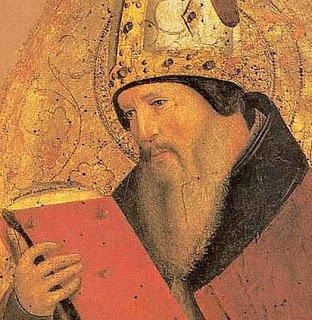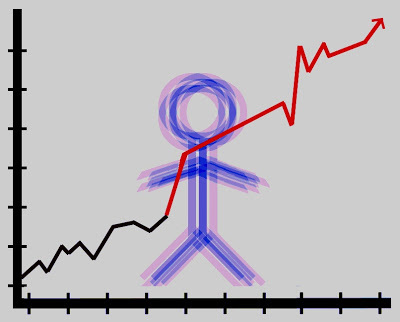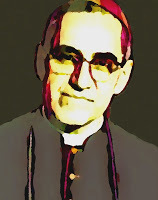John Janaro's Blog, page 205
September 6, 2017
People Disappoint Us, But We Should Love Them Anyway
 Goofy cartoonish picture of the author
Goofy cartoonish picture of the authorWhen we love people, sooner or later they disappoint us. This can make us feel cynical about others and inadequate within ourselves.
Too often when somebody lets us down or distances themselves from us, we feel like this somehow reflects an "objective" judgment on our value as persons. On the exterior we might get angry and defend ourselves or lash out at the other person, or we might think critically of them, but on a deeper level it eats away at our sense of self-worth. It's like "they dumped me because I'm not worth it" and then we inwardly recite the litany of all our flaws, and the anxiety and depression "switches" get flipped, and we spiral downward. Well, that's the way I have been, anyway. It took many years for me to realize that that's just not reality.
This is reality: You are a person. You are a gift. You are made to love and to be loved. Your very existence is a gift to those who encounter you, and if you give yourself in love, in friendship, in compassion, you aspire to be received by another, to be embraced, to be loved. That aspiration is not selfish. It is properly personal. It might (usually does) get mixed up with selfishness to some degree, but the foundation is real and worthy.
In daily life, we offer ourselves to other human persons. But people (every one of us) are a mysterious intersection of temperament, problems, original-sin-based-wonkiness, a thousand quirks, hidden hurts and hidden preoccupations, and FREEDOM... all under the even deeper mystery of God's infinitely discrete, clever, and relentless grace.
We can't fix one another. We offer ourselves, and it's a risk... but it's also a victory, always. Real self-giving (ordinary daily self-giving) is always constructive. Sure, we're not perfect. We have to pray and open ourselves more to God's love, to work on our faults with persistence and patience, to practice courtesy in our relationships, to benefit from what others can teach us by their counsel and their example. If people turn away from us because we really have hurt them, we should seek to make amends and ask for forgiveness.
But there is something distorted about the consistent perception that if we are not loved, it is entirely our fault, it is because we are defective or somehow less than fully human persons. This is often a feature of the pathology of depression, but our freedom is involved here too, in that we do not want to give in to self-pity, resentment, and discouragement, and begin to block off the love that God offers to us--especially the way He gives Himself through the feeble and often disappointing love of our brothers and sisters.
We are made for love and worthy of love. The hope of being loved by another is not an illusion or a selfish flaw. Jesus says, "Give and you shall receive." The gift of self is a mysterious outpouring, a self-"emptying," a "disinterest" not because by it we devalue ourselves, but rather because in it we grow beyond the incomplete "place" of ourselves from moment to moment. But our seeking is destined to be fulfilled.
In human love we experience a sign of this fulfillment, but also something that can only fall short--if for no other reason than that even the most perfect human love is less than infinite Love. So we experience one another, and the hope for a definitive fulfillment grows, patience widens our hearts, we learn to forgive and to be forgiven, to bear with one another and to help one another.
We do "lose ourselves" when we love, but the promise is that we will find ourselves, even through pain.
Published on September 06, 2017 20:13
September 5, 2017
Happy Saint "Mother Teresa" Day!
Happy Saint "Mother Teresa" Day!
Today is the twentieth anniversary of the death of Mother Teresa of Calcutta (September 5, 1997). Those of us who remember her must pass on her witness to the generation that has grown up after her death: her enduring witness of love and compassion and reverence for the dignity of every human person.

Today is the twentieth anniversary of the death of Mother Teresa of Calcutta (September 5, 1997). Those of us who remember her must pass on her witness to the generation that has grown up after her death: her enduring witness of love and compassion and reverence for the dignity of every human person.

Published on September 05, 2017 20:33
August 31, 2017
Freedom and Friendship in Christ
 Several very simple but supportive gestures of solidarity experienced in recent months have led me to ponder once again with gratitude the tremendous grace that is Christian friendship.
Several very simple but supportive gestures of solidarity experienced in recent months have led me to ponder once again with gratitude the tremendous grace that is Christian friendship. This unique kind of friendship is founded on a unique kind of sharing of life, which St. Paul calls koinonia, and which we translate as "communion"—it is the communion of life in Christ, from its transcendent center to its many particular expressions. Because it really is a participation in God's love in Christ, this communion is not—in itself and by its own proper character—anything like a conformist imposition or an invasive smothering of the person (and insofar as we drift into this sort of reductionism in our living out of relationships with one another, we are not being true to the koinonia of Christian friendship). Our communion in Christ is a unity-in-diversity of persons; it is an interpersonal environment in which the special vocation of each person is discovered and flourishes.
Since the person discovers his or herself and realizes his or her freedom through self-giving love, there is always a reciprocal relationship between the authentic realization of personal freedom and the building up of communion.
Communion and liberation. They are inseparable. Thus Jesus Christ, who creates the definitive communion of life, fulfills the destiny of the human person and the human community.
Published on August 31, 2017 07:55
August 30, 2017
The Wonders of the Sun and the Terrors of the Storm

My heart goes out to all the people who are suffering in different ways from the furies of the weather in these recent days.
Published on August 30, 2017 20:38
August 28, 2017
Augustine Speaks to God, and Writes a Book for All of Us
 Today we remember the great Saint Augustine, the man who found Jesus and in following Him chose to abandon his profession as a rhetorician, and his aspirations to "make beautiful and compelling presentations using words."
Today we remember the great Saint Augustine, the man who found Jesus and in following Him chose to abandon his profession as a rhetorician, and his aspirations to "make beautiful and compelling presentations using words."Then, in one of history's great ironies, Augustine told the story of how he found Christ, and in so doing he crafted one of the most beautiful and compelling presentations using words that has ever been written.
He addresses his words to God, and yet, in writing this singular work of literature—his Confessions—he teaches human beings from every place and time about the hearts they possess, full of yearning, deceived by sin, and longing for salvation, healing, and peace:
"You have made us for yourself, and our hearts are restless until they find rest in You....Who shall bring me to rest in You? Who will send You into my heart so to overwhelm it that my sins shall be blotted out and I may embrace You, my only good?.... Behold, the ears of my heart are before You, O Lord; open them and say to my soul, 'I am your salvation'. I will hasten after that voice, and I will lay hold upon You. Hide not Your face from me. Let me die so that I may see it, for not to see it would be death to me indeed" (Confessions, Book I).Throughout his account and up to its decisive moment, he crafts an unparalleled poetic expression of human desire, failure, and struggle, and above all the joy of encountering God through Jesus Christ. These words are classic, and it doesn't seem that we can ever ponder them too much:
"Late have I loved you, O Beauty ever ancient, ever new, late have I loved you! You called, You shouted, and You broke through my deafness. You flashed, You shone, and You dispelled my blindness. You breathed Your fragrance on me; I drew in breath and now I pant for You. I have tasted You, now I hunger and thirst for more. You touched me, and I burned for Your peace" (Confessions, Book X).It may seem crude for a secondary source to try to recount the conversion of Saint Augustine, and yet people have been doing it anyway for well over a thousand years. Though they cannot replace or reproduce anything like the original, they have their own modest reasons for attempting to take the measure of some aspect(s) of this towering man.
I have participated in the ongoing effort to write about Augustine in what was just the second article of my regular column in MAGNIFICAT, "Great Conversion Stories" (the column has now been running nearly four years with more to come). My article on Augustine appeared way back in the January 2014 issue of this beautiful monthly journal of prayer, meditation, readings, and art (you can subscribe by clicking HERE).
Since I get new readers all the time, I thought I would share again this (poor quality but legible) reproduction of the column:

Published on August 28, 2017 13:26
August 26, 2017
Experiments in Graphic Art: The Cartoony Flower

Here I attempted to us a cartoon style photo editor, supplemented by the usual photo editing software that I have in my toolkit, in order to produce this... well... cartoony flower.
One would think by the way these applications present themselves that it would be very easy. But it actually took some time and considerable effort to get the particular structure and the corresponding colors that I wanted for this image. It was, in fact, harder than I thought it would be to produce this modest result.
Whatever its merits, it has gone through a process from being excerpted from my camera photograph to a series of precise edits with filters and adjustments but also using the tools "by hand" (still gotta use a mouse to "draw" and click for certain things). Though never touched by a real pen or pencil, it's entitled—in the broader sense in common use today—to be called an experiment in "graphic" art.
Published on August 26, 2017 20:21
August 23, 2017
The Courage to be Seen
I'll take this opportunity to get the blog up to date with my more recent experiments in computer graphics and the artistic presentation of text.
This is a simple format with some filtering for an excerpt from a text of Pope Francis. These are, once again, challenging and crucially formative words for anyone who follows Jesus Christ:

That crowds a lot of words into a square, of course. I was working with the ideal shape for an Instagram post. Perhaps it's a bit much for Instagram; I often still think in the text, font, and page formatting of the late twentieth century. I'm a rather old dog who is trying to learn a few new tricks, slowly.
Here below is another arresting passage from a homily of the Pope that I arranged in conjunction with an image. This passage is shorter and more visually engaging:

And then there's this text, with colors and geometric patterns:

I also have a couple of Scripture texts in graphic form using various editorial techniques:


This is a simple format with some filtering for an excerpt from a text of Pope Francis. These are, once again, challenging and crucially formative words for anyone who follows Jesus Christ:

That crowds a lot of words into a square, of course. I was working with the ideal shape for an Instagram post. Perhaps it's a bit much for Instagram; I often still think in the text, font, and page formatting of the late twentieth century. I'm a rather old dog who is trying to learn a few new tricks, slowly.
Here below is another arresting passage from a homily of the Pope that I arranged in conjunction with an image. This passage is shorter and more visually engaging:

And then there's this text, with colors and geometric patterns:

I also have a couple of Scripture texts in graphic form using various editorial techniques:


Published on August 23, 2017 20:30
August 19, 2017
Their Death is NOT Just a Statistic
 It keeps happening. This strange, violent, awful way of dying.
It keeps happening. This strange, violent, awful way of dying.I refuse to be reconciled to it, as if it were some phenomenon of social science or an unavoidable fate for certain people.
I keep trying to write this post, but I can't find any adequate way to talk about it. There really isn't an adequate way.
We live in tumultuous times. Our immensely powerful and stressful world pushes forward with a relentless force that continually multiplies itself, enlarges itself, leaping over limits of speed, annihilating space, defying gravity, racing in all directions. We are all riding behind this wild engine, gasping for air and grasping for a place to hold on. We don't really know who's driving or where it's going. Perhaps we are lucky enough to have learned some tricks for hanging on to this crazy train.
But people face all kinds of challenges and make a lot of mistakes. Some of these challenges are complicated by mental disorders that become more exacerbated by this wild ride. They are slipping and having trouble regaining their footing.
They're falling off the train. Too many of them are falling off the train. (But what is "too many"? One is too many!)
From all the noise and the scramble, they find no peace. They only fall into the cold stillness of the ground. And they are hardly noticed.
Suicide has become a statistic.
It will never be just a statistic for me! There are too many names and faces, too many people I love who have been devastated by this awful thing. Too many people who have been lost, or who have had their loved ones ripped away from them.
I know the trajectory of Depression, and how its internal chaos can connive with the recklessness of a toxic environment. I know that we must never give up hope. We must hope in the infinite mercy of God, and recognize all the factors that can diminish or eliminate culpability when a person does something that brings their life to an end.
I have a precious friend for whom I keep that flame of hope burning. Let us keep those flames burning, even though it means that our own hearts will continue to be struck and scarred by the heat.
Let us grieve and hope for our loved ones, and stand in solidarity with others who have lost their loved ones. At the same time, we must recognize that suicide is a disaster that stands at the end of a chain: often a bizarre and complex chain that has lots of links (and we must do as much as we can to understand and try to unhook those links). Still it is a chain that is held by the hand of the Enemy of the human race.
We must oppose this Enemy without compromise. Jesus tells us clearly: the Enemy is a liar and a thief! No compromise. Suicide is never, never the answer...to anything.
Dear suffering people, it is good that you are here. Stay!
Published on August 19, 2017 20:53
August 15, 2017
Birth of Oscar Romero, August 15, 1917
 Today is the centennial of the birth of one of the truly great prophetic witnesses of the 20th century: martyr, bishop, lover of Christ and His poor, "man of the Church"—Blessed Oscar Romero (1917-1980).
Today is the centennial of the birth of one of the truly great prophetic witnesses of the 20th century: martyr, bishop, lover of Christ and His poor, "man of the Church"—Blessed Oscar Romero (1917-1980).Blessed Romero, pray for the peoples of the Americas, pray that we might have the courage to love, to work for justice, peace, and solidarity.
Published on August 15, 2017 20:49
August 14, 2017
Conflict and the Way of Love
The words of Saint Maximilian Kolbe during the darkest moments of his own time speak eloquently to each one of us in the midst of the crises of the present day, and of those yet to come:

Kolbe knew that the only way to resolve the conflicts of society and the conflict within ourselves is the way of love. This way is possible because God loves us first, and empowers us by His grace to love Him and be transformed in His likeness.
Thus we love God our Father who makes us, through Jesus Christ who died for us and rose from the dead, in the Holy Spirit who descended upon the Virgin Mary and who continues to enter intimately into our lives in union with her maternal love, her all-holy, all-beautiful, all-pure woman's heart that loves each and every human person with inconceivable tenderness.
In this way God's goodness shapes us as children of adoption; the tenderness of Mary shapes our way of seeing and our response to every person. Maximilian Kolbe's own life and death show us how tremendous the response of love can be.


Kolbe knew that the only way to resolve the conflicts of society and the conflict within ourselves is the way of love. This way is possible because God loves us first, and empowers us by His grace to love Him and be transformed in His likeness.
Thus we love God our Father who makes us, through Jesus Christ who died for us and rose from the dead, in the Holy Spirit who descended upon the Virgin Mary and who continues to enter intimately into our lives in union with her maternal love, her all-holy, all-beautiful, all-pure woman's heart that loves each and every human person with inconceivable tenderness.
In this way God's goodness shapes us as children of adoption; the tenderness of Mary shapes our way of seeing and our response to every person. Maximilian Kolbe's own life and death show us how tremendous the response of love can be.

Published on August 14, 2017 20:54



